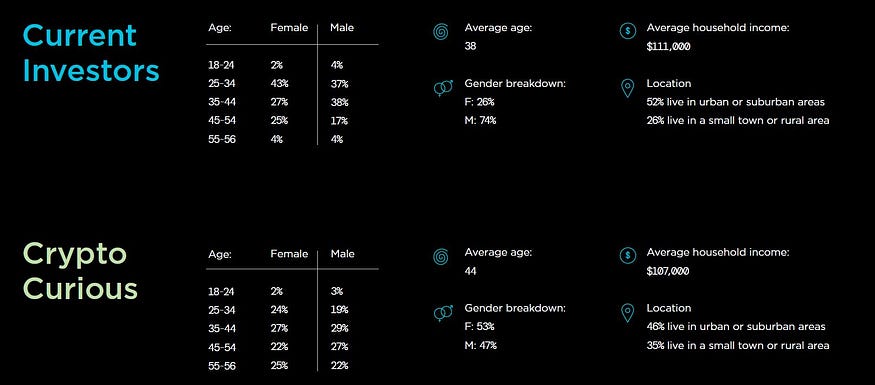Survey of 2021 Crypto Report Globally
Baby Boomers (born 1946–1964), and Generation-X (born 1965–1980) investors worldwide heaped up cryptocurrencies and increased their Bitcoin investment since the start of the pandemic. It could potentially reveal an unprecedented change in the way investors see today, as a result of the global pandemic. In 2020 we witnessed institutional investors step forward in public support of cryptocurrency and major companies like Twitter, PayPal, and MicroStrategy put forward plans to either support crypto payments or openly invest in it themselves by adding it to their balance sheets.

With interest in crypto — and its earning potential — higher than ever, we took a closer look at what investors and crypto-curious consumers all over the world think about the asset, including standout trends among holders and what actions we can expect from those who are curious about crypto to take in 2021. The data reveals that crypto is largely not an ephemeral or opportunistic trade, but rather a smart part of a long-term strategy, as the majority of crypto investors are buying to hold for the long haul. This shift in age, gender, average income, and location indicates that crypto is starting to broaden its appeal away from an investment solely reserved for those with a large amount of assets to one that is more mainstream and accessible for the average person.
–According to the Gemini State of U.S. crypto report, it estimates that roughly 14% of the U.S. population owns cryptocurrency. This translates to 21.2 million U.S. adults who own cryptocurrency, and other studies estimate this number to be even higher. Roughly 13% of U.S. adults plan to purchase cryptocurrency in the next 12 months. This adds up to approximately 19.3 million adults — which would nearly double the current crypto investor population.

2021U.S.Crypto Report | Section I
–New research from one of the top 10 major banks in Russia, Otkritie Bank, has found that 14% of Russians think crypto will replace fiat in 10 years. In Moscow, there appears to be more optimism toward crypto, with 21% of respondents believing that cash will be replaced by crypto and digital currency in the next decade. Furthermore, four out of 10 believe banks will transform themselves into “digital ecosystems” in the future. The Bank of Russia has announced the central bank digital currency will go into pilot trials in 2022.
–Blockchain associations from Australia and five Southeast Asian nations are joining forces to promote blockchain development and education. Blockchain organizations from Australia, Singapore, Malaysia, Thailand, Indonesia and the Philippines signed a memorandum of understanding to promote blockchain collaboration in the Asia Pacific. According to data by Statista, Southeast Asia was among the top regions in terms of crypto adoption last year, with 20% of Filipino survey respondents indicating that they used crypto in 2020.

–A survey of over 2000 Australian investors has found that cryptocurrency is a more popular investment than gold and silver. The poll found that 12.6% of Aussie investors hold Bitcoin or other cryptocurrencies, compared to 12.1% who hold precious metals. The largest demographic of Aussie crypto investors (36.3%) in the survey were aged between 25–34, followed by those aged between 35–44 at 30.1%. Men accounted for 63% of all crypto investors, and one in four earned an income of more than $100,000 per year. BTC Markets CEO Caroline Bowler noted that an increasing number of older Australians are investing in crypto, with investors 60-plus doubling in number over the past couple of years to make up 10% of the client base. The research is broadly in line with other polls, including one in December that found almost one in five Australian adults owned crypto in 2020.

–China has charged ahead with a bold effort to remake the way that government-backed money works, rolling out its own digital currency with different qualities than cash or digital deposits. The country’s central bank, which began testing eCNY last year in four cities, recently expanded those trials to bigger cities such as Beijing and Shanghai. China may test its digital currency with foreign visitors at the 2022 Beijing Winter Olympics.
–The UK Chancellor of the Exchequer announced the launch of a CBDC task force, bringing together the Bank of England and Her Majesty’s Treasury to coordinate the exploration of a potential central bank digital currency.
–The UAE is already a leader in the adoption of blockchain with a national strategy in place and the aim to conduct 50 percent of government transactions using the payment technology by 2021.
–Mercado Libre’s move to accept cryptocurrency payments for real estate could usher in a new way of crypto mass adoption in South America. The $81 billion retailer is the second largest company in South America and is present in 18 countries, including its three largest markets, Brazil, Argentina, and Mexico.
Bitcoin’s annualized returns have eclipsed all other asset classes by a big margin. Over the past 10 years, BTC has beaten out all over asset classes by at least a factor of 10. Square CFO says there’s “absolutely a case” for all balance sheets to have Bitcoin. Visa CEO Al Kelly said the payments giant is in a position to make cryptocurrencies more “safe, useful and applicable” and may add them to the company’s payments network. As cryptocurrencies become widespread, it will no longer be a separate section, but a payment option filter like any other. Global payments giant Mastercard has conducted a survey of 15,569 consumers in 18 countries and found that 4 in 10 people plan to use cryptocurrency in the next year. Meanwhile, 93% of people will consider using at least one emerging payment method, such as cryptocurrency.

It’s clear that crypto awareness is spreading, and acceptance is becoming more and more mainstream. There are many more people who are crypto curious than who are completely disinterested in crypto, which is promising for the future of crypto’s growth. We are encouraged to see expanding curiosity from a variety of people across all walks of life. It’s never been more important for crypto custody and trading platforms to be accessible, affordable, and secure. WageCan is at the forefront of the industry from a regulatory and security perspective as we seek to help bring Bitcoin solutions into the mainstream. You are very welcome to learn more about WageCan’s mission and commitment to crypto investment at [email protected].